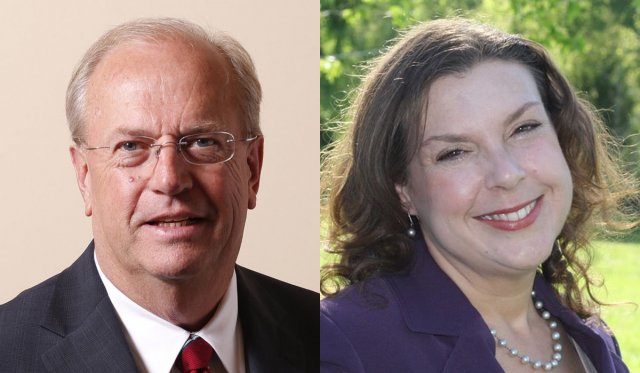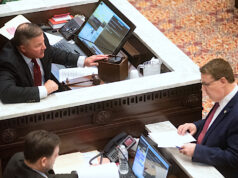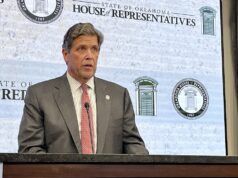

Danny Williams represented House District 28 from 1988 until 1994, when he left to run for governor. He also ran for the State Senate in 2014. He didn’t win either of those offices, but now he hopes to reclaim his seat in the House more than 25 years later.
“I’m winding down my career and have some free time to do some things — make a difference,” Williams said. “I felt like it was my time to step back in and bring whatever wisdom and experience that I have and help apply [them] to make District 28 successful.”
Williams, who owns an internet-service company, represented HD 28 as a Democrat the first time around, but he has since become a Republican and on Election Day he’ll be facing Democrat Yasminda Choate.
Choate is a professor of English at Seminole State College and a poultry farmer. She also serves as the chairperson for the Seminole County Democratic Party.
HD 28, which covers ground in Seminole and Pottawatomie counties, was recently vacated by now-Sen. Zack Taylor (R-Seminole), who became the senator for Senate District 28 earlier this year when he won the Republican primary. (No other parties had candidates in that race.)
Cross-aisle skepticism leads to canceled debate
Having crossed the political aisle himself doesn’t make Williams any less wary of those on the other side. Speaking to NonDoc, he asked several times to know the reporter’s political affiliation. He said he did the same with a Seminole high school student who had arranged a virtual debate between the candidates that was ultimately canceled when Williams backed out at the last minute.
“First of all, this guy called me — told me he was doing it for the high school newspaper,” Williams said. “And I said, ‘Are you a Democrat? Are you doing this for another purpose?’”
Williams said he withdrew because he suspected the debate was partisan, partly because it was being hosted on Choate’s Zoom account.
“I don’t know if Mr. Williams thought we wouldn’t play fair; but there was never any subterfuge about to who was running the meeting — who was moderating,” Choate said. “We’re using my Zoom account, but that’s just because I have one. I’m paying for it anyway.”
Williams said he simply disagreed with how the debate was set up, but doesn’t have a problem debating in general.
“I don’t have any problem discussing anything with her or anybody else, as long as it’s an unbiased situation,” he said. “But this — I asked questions and I felt like it wasn’t forthright.”
Common ground and differing approaches
Despite their party differences, the candidates have common ground on some issues. For instance, they agree about the need for better water management and broadband internet for their district.
They also both emphasize the need for economic and job development in the area, though they approach the issue somewhat differently.
Williams — whose campaign website describes him as an “experienced businessman,” a “community leader” and “dedicated to faith and family” — said he would focus on helping the businesses in the area thrive.
“I want to help make fair job opportunities. Because I know that 90 percent of jobs created are created from existing business,” Williams said.
Choate’s campaign website names her top three issues as health care, education and economic development. She argued that the district needs to diversify its economy.
“Oklahoma has failed its rural areas by focusing its attention primarily on growth in the oil and gas industry,” she said. “We have let our rural areas languish. What we’ve seen is business closing because of the lack of investment.”
They also have different ideas about the handling of the COVID-19 pandemic.
Williams called the pandemic a “sad situation” and mentioned that he’d lost a neighbor to the virus.
“I live my life everyday,” Williams said. “I wash my hands and I do all the hygiene things I possibly can. Most of the masks available today really don’t have any influence on anything. I wear a mask when I have to, but I don’t when I don’t”
Williams said he believes in taking precautions, but that the pandemic is “one of those things where you have to live through it.”
“Going forward, we have to do what we can to eliminate the possibilities of this growth,” he said. “We also have to live our lives. We can’t stick our heads in the ground or close our doors and not go out. We have to make a living.”
Choate attributes the persistence of the pandemic to leaders who “won’t take a stand.”
“We’re seeing a spike in cases in part because we have leadership that simply won’t take a stand,” Choate said. “For example, mask mandates are not a thing out here in the rural areas. So it’s really hit or miss as to which stores I’m willing to walk into.”
Choate said she voted in favor of State Question 802, which expanded Medicaid coverage in Oklahoma, but she’s voting against SQ 814, which offers a potential source of funding for the expansion by limiting new deposits in the state’s Tobacco Settlement Endowment Trust.
“It has been a complicated thing for me. I know that the state needs funds [for] Medicaid expansion now that we’ve passed SQ 802,” she said. “However, I also know that the state has an obligation not to borrow funds from one place. It needs to be part of the regular budget appropriation.”
Opponents without comment
Asked what separates them from their opponent, the candidates said they didn’t know each other and don’t have much to say, but their non-comments spoke volumes.
“To be honest with you, I don’t know her,” Williams said of Choate. “I know people have told me she’s extremely liberal. And I would call myself conservative. If you want the things that are happening at the national level — if you want that kind of leadership and attitude in office, then you can choose her.”
Choate was more taciturn.
“One of the questions I get most often is: Who am I running against?” she said.




















